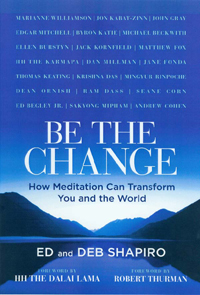
We had been traveling around the world and came back to visit with Ed's family. We were sharing with them a scary story of when we had been on a train in India. It was a very crowded train and Ed had to put his arm around Deb so we could sit closer together and make more space. In India, traditionally, men are not meant to touch a woman in public, and this move triggered a negative reaction in one of the men on the train. He started getting quite abusive and angry, even violent towards Deb, as he saw her as behaving like a prostitute.
We were sharing this story as an example of the misunderstandings that can occur when traveling in different cultures, but it triggered Ed's cousin to fall into an old family pattern of making Ed wrong, even though it wasn't his fault. Many of you might have that with your family. She started shouting that he should have known better than to put his arm around Deb and got quite upset at what she perceived as his bad behavior. When asked her to stop shouting, she replied, "I can't. This is the way I am!"
Ed's cousin is no different than the way many of us are. It is very natural to have this tendency to see ourselves as fixed or unchangeable. Perhaps you have heard this story about a frog and a scorpion:
One day a frog was sitting happily by the side of the river when a scorpion came along. "Oh Mr. Frog," said the scorpion, "I need to get to the other side of the river to be with my family. Will you please carry me across?"
"But Mr. Scorpion, if I do that, then you will sting me!" replied the frog, somewhat aghast at the request.
"No, I won't," said the scorpion.
"Do you promise?" asked a rather doubtful frog.
"I really promise--I will not sting you," said the scorpion.
"Do you really, really promise?" asked a still-dubious frog.
"Yes, I really promise," replied the scorpion, very sincerely.
"Okay," the frog said reluctantly. "Hop on."
The scorpion climbed on top of the frog's back and they set off. Halfway across the river, the scorpion stung the frog. In horror, the frog, unable to continue swimming and with both of them about to drown, finally managed to gasp, "Please, Mr. Scorpion, just tell me one thing before we both go under. Just tell me why, when you promised you would not, why oh why did you sting me?"
"Because it is my nature," replied the scorpion.
With no intention of being derogatory to scorpions, this story shows how the nature of the scorpion appears unchangeable and fixed. It has no choice regarding its behavior because it is a scorpion; that is simply the way it is.
And most of us think we are just the same. We think we cannot change, that we are the way we are and that's that -- this is who I am and I cannot change and I won't change! We told this story to demonstrate how fixed and self-absorbed we can become, unable to change or adapt, even to the point of jeopardizing our own welfare. But where a scorpion is not necessarily able to act any differently, we can. We do have choices. We do not have to be the way we think we are; we can actually be and act differently.
In the 19th century, the philosopher William James said, The great revolution in our generation is the discovery that human beings, by changing the inner attitudes of their minds, can change the outer aspects of their lives.
We can transform the self-centered aspect of our nature by opening our hearts and awakening to other-centeredness. Then we have the choice to be able to offer generosity in place of selfishness, kindness in place of malice, and harmlessness in place of harm. To illustrate this, here is the end of the story:
Two monks were washing their bowls in the river when they noticed a scorpion that was drowning. One monk immediately scooped it up and set it upon the bank. In the process, he was stung. He went back to washing his bowl, and again the scorpion fell in the river. The monk saved the scorpion and was again stung.
The other monk asked him, "Friend, why do you continue to save the scorpion when you know its nature is to sting?"
"Because," the first monk replied, "my nature is to save."
So, what is your nature? Are you a frog, a scorpion or a monk? Do comment below. You can receive notice of our blogs every Tuesday by checking Become a Fan at the top.
You can order a copy of our latest book at: BE THE CHANGE, How Meditation Can Transform You and the World.

****
Ed and Deb Shapiro's new book, BE THE CHANGE, How Meditation Can Transform You And The World, forewords by the Dalai Lama and Robert Thurman, with contributors Marianne Williamson, astronaut Edgar Mitchell, Michael Beckwith, Jon Kabat-Zinn, Byron Katie, Jack Kornfield, and others.
Our next BE THE CHANGE talk and workshop: March 12th and 13th in Boulder, Colorado. Call: Gloria at 303 449 3066
Experience our 3 meditation CD's: Metta - Loving kindness and Forgiveness; Samadhi - Breath Awareness and Insight; and Yoga Nidra - Inner Conscious Relaxation, available at: www.EdandDebShapiro.com
Deb is the author of the award-winning book YOUR BODY SPEAKS YOUR MIND.